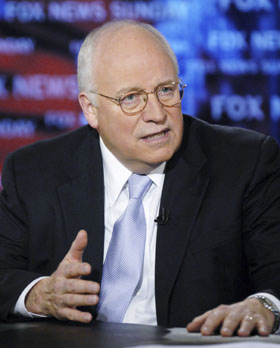Bush: Iraq troop boost 'going forward'
(AP)Updated: 2007-01-15 09:55
WASHINGTON - Digging in for confrontation, US President Bush and Vice President Dick Cheney say they will not budge from sending more US troops to Iraq no matter how much Congress opposes it.
 US Vice President Dick Cheney speaks on Fox News Sunday in Washington, January 14, 2007. [Reuters]  |
"I fully understand they could try to stop me," Bush said of the Democrat-run Congress. "But I've made my decision, and we're going forward."
As the president talked tough in an interview that aired Sunday night, lawmakers pledged to explore ways to stop him.
"We need to look at what options we have available to constrain the president," said Democratic Sen. Barack Obama of Illinois, a possible White House candidate in 2008. Democrats remain wary, though, of appearing unsupportive of American troops.
A defiant Cheney, meanwhile, said Democrats offered criticism without credible alternatives. He pointedly reminded lawmakers that Bush is commander in chief.
"You cannot run a war by committee," the vice president said of congressional input.
The aggressive White House reaction came as the House and Senate prepare to vote on resolutions opposing additional US troops in Iraq.
As the White House watched even some GOP support peel away for the war plan, it went all-out to regain some footing.
Bush gave his first interview from Camp David, airing Sunday night on CBS' "60 Minutes." It was his second prime-time opportunity in five days to explain why he thinks adding US troops can help stabilize Iraq and hasten the time when American soldiers can come home. He addressed the nation from the White House last Wednesday evening.
"Some of my buddies in Texas say, 'You know, let them fight it out. What business is it of ours?'" Bush said of Iraqis. "And that's a temptation that I know a lot of people feel. But if we do not succeed in Iraq, we will leave behind a Middle East which will endanger America."
Yet when asked if he owes the Iraqi people an apology for botching the management of the war, he said "Not at all."
"We liberated that country from a tyrant," Bush said. "I think the Iraqi people owe the American people a huge debt of gratitude."
Bush announced last week he will send 21,500 more troops to Iraq to halt violence, mainly around Baghdad, as an essential step toward stabilizing the country's government.
Democrats in Congress - along with some Republicans - were unimpressed and frustrated. Beyond promising to go on record in opposition to the president's approach, the Democratic leadership is considering whether, and how, to cut off funding for additional troops.
"You don't like to micromanage the Defense Department, but we have to, in this case, because they're not paying attention to the public," said Rep. John Murtha, a Pennsylvania Democrat who helps oversee military funding.
It is unclear how any effort by Congress could affect Bush's plan. National Security Adviser Stephen Hadley said the White House already has money appropriated by Congress to move the additional forces to Iraq.
GOP Sen. John McCain of Arizona, a potential 2008 presidential contender who endorses Bush's call for more troops, said votes to express disapproval were pointless.
"If they're dead serious then we should have a motion to cut off funding," he said of those fighting Bush's strategy.
Many Democrats favor a phased withdrawal of US troops, along with new diplomatic efforts with Iraq's neighbors.
The Bush administration had hoped that the president's overhauled strategy would lead to some bipartisan unity or that the White House would at least get an extended hearing before legislative leaders made up their minds. Instead, it encountered majority opposition in Congress and a public that rejected by large polling margins the military and political ideas Bush announced.
"I'm not going to try to be popular and change principles to do so," Bush said when asked about his standing with the public.
In the interview, Bush rejected an assertion that, time and again, his administration hasn't been straight with the American people about Iraq. He said his spirits were strong.
"I really am not the kind of guy that sits here and says, 'Oh gosh, I'm worried about my legacy,'" Bush said.
The president also said he saw part of the Internet-aired video of the execution of Saddam Hussein, which showed some Iraqis taunting Saddam as he stood with a noose around his neck on the gallows. He said it could have been handled a lot better.
Bush said he got no particular satisfaction from seeing Saddam hang. "I'm not a revengeful person," he said.
Hadley was interviewed on "This Week" on ABC and "Meet the Press" on NBC. Cheney was on "Fox News Sunday." Obama was on CBS' "Face the Nation." Murtha appeared on ABC's "This week."
|
||
|
||
|
|